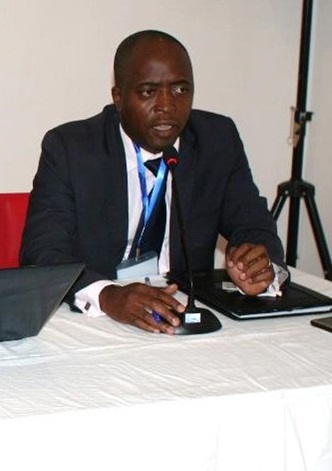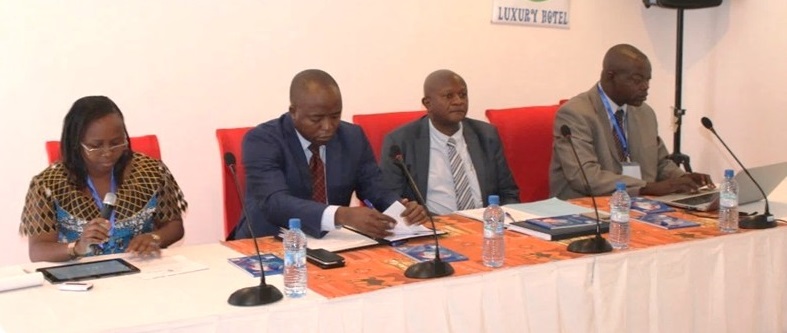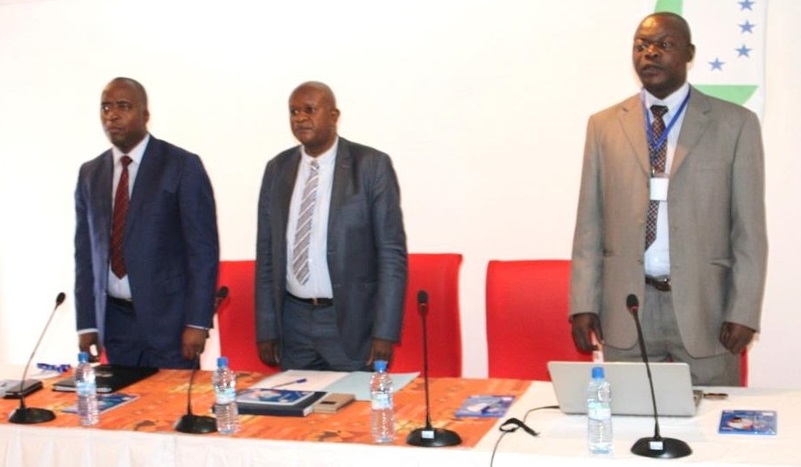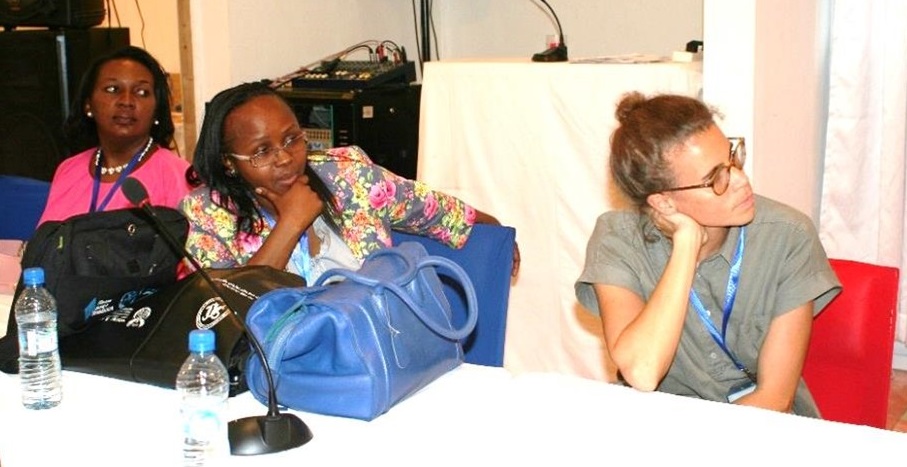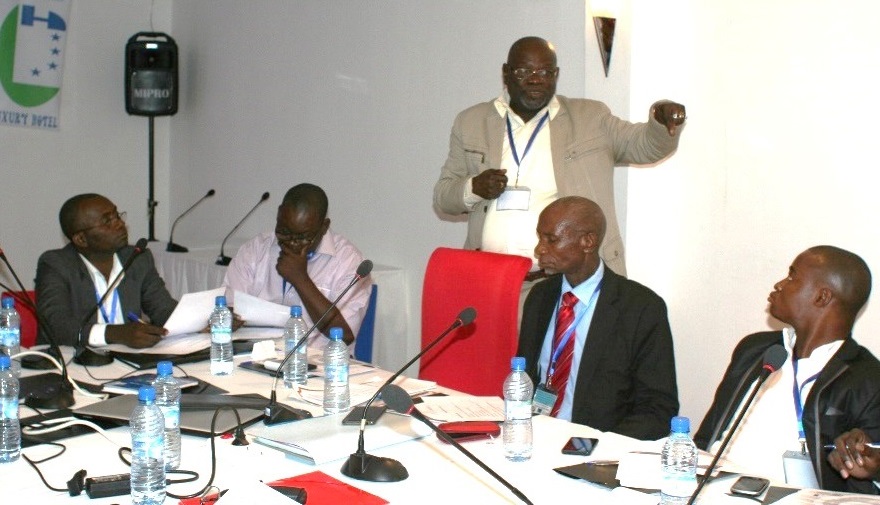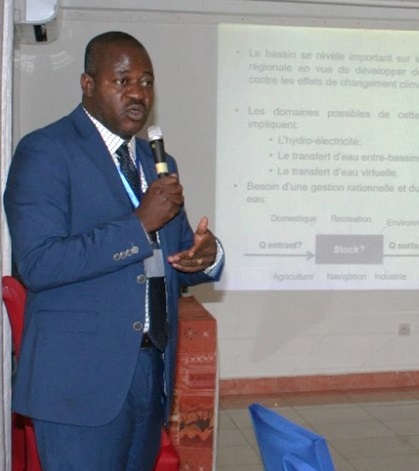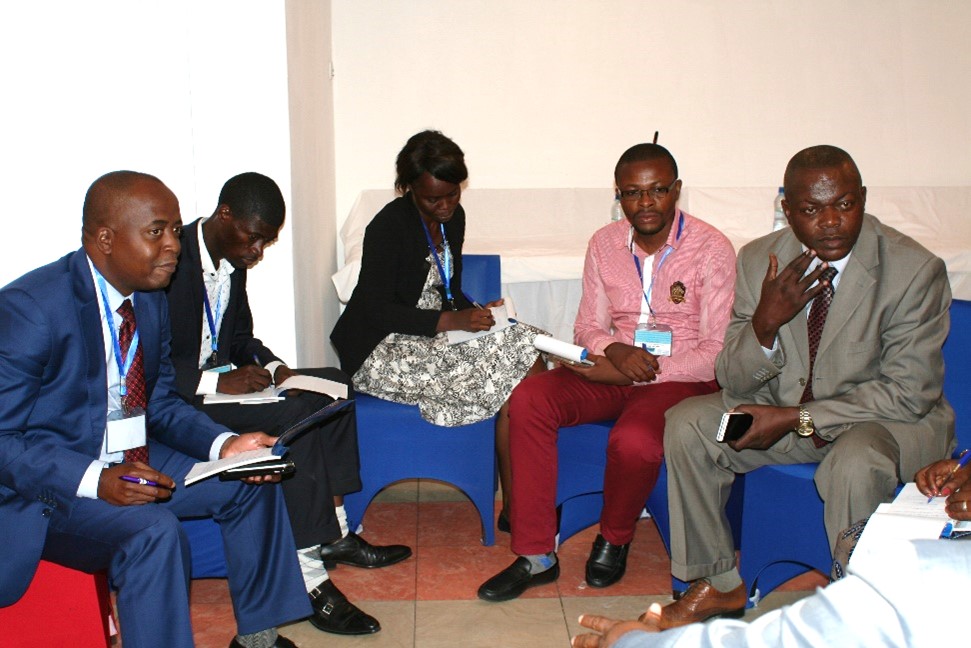Context and justification
of the Regional School of Water
The importance of water cannot be emphasized enough. Water is not only vital for the human population in terms of domestic needs, but it is also directly and indirectly linked to many other areas such as agriculture, energy, environment, tourism, recreation , economy and health. Ensuring the sustainability of this resource has become a global concern, and therefore capacity building in water resources is highly necessary.
The Congo Basin region is located in the heart of Africa and is shared by nine riparian countries. Hydrologically, the Congo Basin is the second largest river basin in the world, after the Amazon. It generates an annual volume of water of approximately 1,300 billion m3 at its outlet, which represents more than half of the total flow of the African continent (Tshimanga, 2012). The Congo Basin offers opportunities for the production and provision of many goods and services, including agriculture and food security, fishing, hydropower, water supply, transport and maintenance of aquatic ecosystems. Overall, the basin has the potential to play a leading role in regional cooperation to reduce poverty, while providing livelihood and income opportunities for communities.
The questions of the water resource potential of the DRC and the Congo Basin were addressed in several respects. The region faces multiple challenges related to water, including the lack of adequate knowledge on water dynamics, its distribution in time and space, the interactions to which it is subject, as well as how our efforts should be coordinated to improve security of supply and ensure its sustainability.
Although the number, complexity and severity of water-related problems continue to increase, investment in training and capacity building necessary to develop a better understanding of water resource dynamics and improve the access to their services is sorely lacking. Indeed, there is no coordinated process for considering water resources training needs, prioritizing them for funding purposes, or for evaluating the effectiveness of training programs. Capacity building needs for sustainable water resources management have been assessed through various reports, but implementation remains difficult, partly due to the absence of a solid supporting strategy. The achievement of sustainable development and inclusive growth in the DRC and the Congo Basin region would be largely compromised if water resources are not managed and used in a sustainable, integrated and efficient manner. As countries in the Congo Basin region strive to improve political, economic and social stability, the need for secure water supplies will become increasingly important.
If this aspect is neglected, there are risks of conflicts :
- within communities - due to lack of access to water resource services
- between countries - due to the lack of agreement on the cross-border sharing of water resources and
- between social groups due to a sharing of water resources perceived as non-inclusive and equitable (distributive justice).
This therefore requires concerted actions oriented towards innovative research and capacity building in order to promote harmonious and efficient use of the water resources of the DRC and the Congo Basin region.
In November 2013, a workshop on training and research needs in water resources in the Congo Basin was organized in Kinshasa by CB-HYDRONET and the Department of Natural Resources Management of the Faculty of Agricultural Sciences of the University of Kinshasa and their partners Cap-Net UNDP and GWP-CAF. The results of the workshop showed that:
- The water sector in general suffers from a lack of qualified personnel to undertake water resources planning and development actions.
- Universities as well as other higher education institutions in the country provide introductory training in water sciences taught in second cycles, which are not sufficient to provide learners with sufficient knowledge enabling them to cope effectively to the numerous water problems facing the country such as hydrometeorological and climatological monitoring to assess the availability of water and its distribution in time and space, hydraulic developments for the mobilization of surface water resources and underground with a view to optimizing production, the development of waterways and agricultural services to facilitate the flow of agricultural products, the mobilization of water and energy for the food processing industry and the supply chain. value of agricultural products, hydraulic development and protection of watersheds to ensure the function of water production and the fight against pollution of waterways, monitoring of floods and drought, the economy of water, fish production, flooding of mines and quarries, drainage of urban water, etc.
- Various educational programs have been implemented in collaboration with regional and international partners, including WATERNET, where students undertake their studies abroad in water-related disciplines, but this does not contribute to achieving a critical mass of professional water needs at the national level.
- Most of these educational programs at the regional or international level are held in English, and the language barrier has also been identified as a major obstacle to the success of these programs for nationals of the DRC, which is a French-speaking country.
- The role of international development agencies in supporting capacity building through education and training remains difficult to assess, as there appears to be no direct impact on the ground. From the respondents' perspective, there are no clear strategies for human resources or institutional capacity building, which clearly shows a problem with the national IWRM implementation policy to help achieve the vision African water.
- The workshop had recommended that a national training program be designed and implemented for education and training with emphasis on specific water profiles at undergraduate and postgraduate levels, development of water centers of excellence for capacity building in water-related disciplines, consolidating the role of existing water capacity building networks to encourage information sharing and implementation of professional capacity building activities.
Another initiative on the assessment of capacity building needs was carried out by the Regional Center for Integrated Watershed Management and the National Water Resources Institute of Nigeria, within the framework of the International Hydrology Program of the UNESCO (AWaCaB). Thanks to this initiative, an assessment was carried out in the DRC with the overall objective of determining the capacity building needs of professionals and training institutions in the field of water to face water challenges in Africa. Figures 1 and 2 present a summary of the compilations of respondents' opinions on a sample of 14 institutions surveyed.
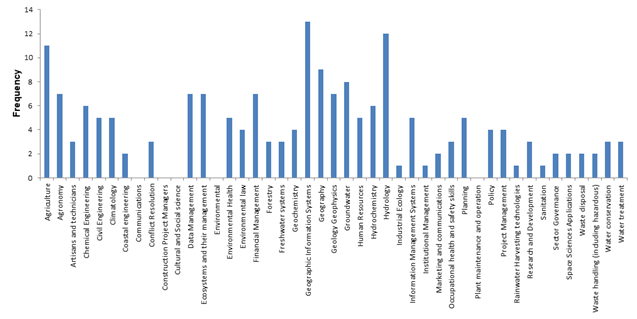
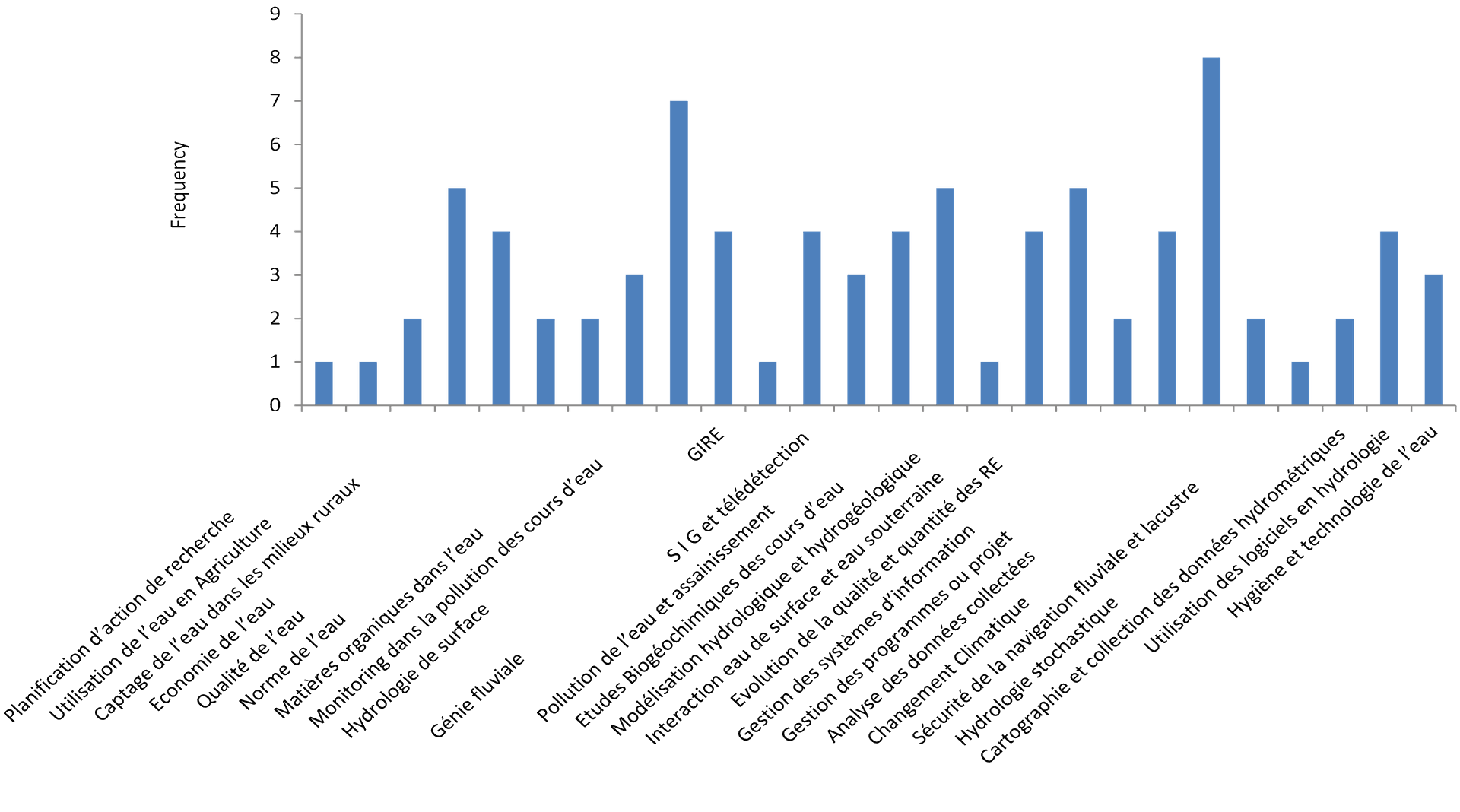
In view of the above-mentioned concerns about the needs for capacity building in the water sector, a workshop was organized from April 4 to 5, 2018, in the conference room of the Hôtel Léon, by the Department of Resource Management Natural Sciences of the Faculty of Agricultural Sciences through its Congo Basin Water Resources Research Center (CRREBaC) in collaboration with WATERNET, the SADC Water Resources Capacity Building Network (Photo 1).
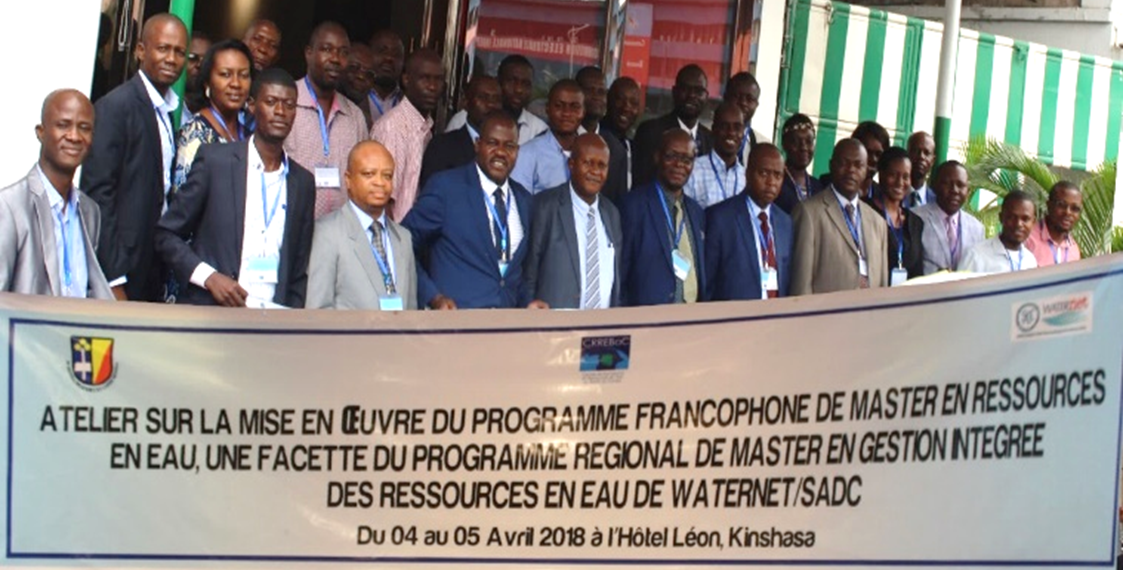
This workshop, which aimed to pave the way for the implementation of a Master's program in Water Resources in the DRC, saw the participation of 48 people representing 22 institutions involved in water issues, notably the universities and research institutions, national hydrometeorological services, water resources management departments, water supply utilities, NGOs, watershed organizations, and international bi-multilateral cooperation institutions (Table 1).
L’approche méthodologique utilisée durant la tenue de l’atelier avait consisté à des présentations et discussions en plénière sur les thématiques pertinentes à la problématique de renforcement des capacités en ressources en eau, et les travaux en groupes, tous orientés vers l’obtention des résultats en termes des objectifs prédéfinis. Les différentes présentations thématiques avaient concerné les points ci-après :
- Status report on water availability, access and development in the DRC: major issues and challenges ;
- Experience in implementing the English-speaking Master's program in Integrated Water Resources Management (IWRM) in the SADC region ;
- Assessment of capacity building needs in the water sector;
- Presentation of the Congo Basin Water Resources Research Center (CRREBaC) as a technical framework for expertise in water resources ;
- Water Professions.
The results obtained at the end of this workshop are summarized as presented below :
- The regional context of the program WATERNET and the opportunity to adapt it to the Master program for the DRC and the French-speaking region are defined ;
- The Master's degree course which corresponds to the needs of the country and the region, and which adds value to existing specializations is designed ;
- The human, financial and technical resources necessary to support the implementation of the French language Master's program in the DRC are inventoried and measures to fill the gaps identified ;
- The end users and how the Master program can help meet their needs and gain stakeholder inputs are identified ;
- The roadmap for the implementation of the French-speaking Master's Program in Water Resources is developed.
Categories of institutions that took part in the Stakeholders workshop on the implementation of the Mater program in Water Resources in the DRC, Kinshasa April 4-5, 2018
From this workshop, it was recommended to CRREBaC what follows :
- Work immediately to mobilize adequate financial and human resources for the implementation of its policy ;
- Validate the teaching programs as designed within a reasonable period of time ;
- Learn about the operation of other similar programs that take place at the regional and international level to learn lessons ;
- Consult the management committee of the Master's program organized at the Faculty of Economics of UNIKIN on the management of economic policies for detailed information on the modalities of their operation ;
- Implement an awareness and media coverage plan for the evolution of the implementation of the program and related activities in the immediate future ;
- Establish a collaborative partnership with users such as the case of the Lukaya River basin.
